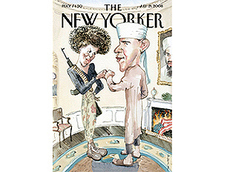What’s on your door? That’s what The Wall Street Journal wants to know. It better not be a religious symbol, according to the federal Seventh Circuit Court of Appeals. At least that’s what lots of folks would have us believe the court said. It sounds like the court has it in for “the Jews” or any other religious group, but it’s not so simple.
The case involved a Jewish family, the Blochs, living in an upscale Chicago condo. The condo owners’ association had for some time enforced (but ultimately retreated from), a rule requiring that the building’s hallways be free not only of shoes and umbrellas, but also anything else — including the mezuzah which the Blochs had affixed to their doorway in fulfillment of the commandment found in Deuteronomy 6.
This was about the court refusing to compensate a family for hurt feelings which resulted from an overly zealous condo board’s attempt to de-clutter their halls, and refusing to codify special protection for other would-be mezuzah hangers. That seems about right to me. The legal wranglers will fight out whether such a neutral prohibition should ever be allowed, or whether it constitutes an absolute, and therefore illegal, barrier to residency for religious Jews who might want to live in the building.
But the real issue here was never the mezuzah, no matter how much some people insist it was. Rather, it was a rigid board that was unable to make appropriate distinctions between a mess in the halls and a religious symbol affixed to someone’s door. Ironically, Mrs. Bloch chaired the committee that created the original set of rules! So it seems that she was undone by those who were even more fanatically narrow in their interpretation of the rules than she. Sadly, this inability to balance competing needs and instead retreat behind rules is common in our society.
And the Blochs are just as guilty as their own board of that obsession with rules over outcomes, even if their basic position makes more sense. How else to explain their need to sue even after the board had retracted its ridiculous ruling prohibiting a Mezuzah? And how can one defend the Bloch’s pursuit of financial compensation, as anything other than a mirror image of the board’s original punitive response to the clutter in the halls?
It’s just one more example of people using religion and the law to prop themselves up when they can’t find a way to work through their differences. That behavior is what people with no regard for either religion or law point to when arguing that each is passé. So in the name of the law and a beautiful tradition, both the Blochs and their condo board have given each a black eye.
And speaking of black eyes, what were the lawyers who filed on behalf of the condo association thinking when they accused the Blochs of “looking for their pound of flesh”?!
I admit that there is some wickedly good humor in using a line describing Shylock to describe this Jewish family seeking money….until you realize how many actual people have been harmed because of just such stereotypes. It was not only inappropriate, but actually plays into the hands of those that would make more of it than it is at precisely the moment we need to make less of these things.
These issues and the rules that go with them are important, but relationships are too, and it is the absence of the latter which lead to a breakdown in the former.

